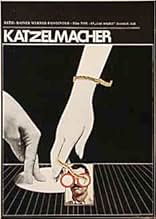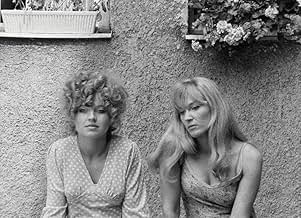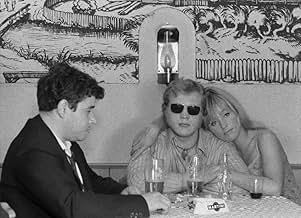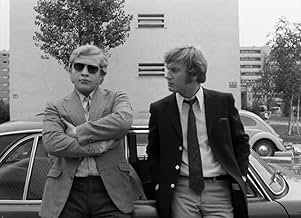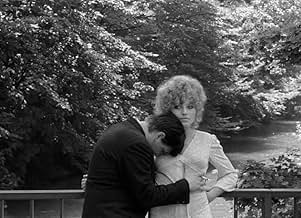अपनी भाषा में प्लॉट जोड़ेंJorgos, a migrant worker from Greece, joins a group of young people in Munich usually hanging around. This foreigner incites hostility and jealousy among them, and he is insulted as a "Commu... सभी पढ़ेंJorgos, a migrant worker from Greece, joins a group of young people in Munich usually hanging around. This foreigner incites hostility and jealousy among them, and he is insulted as a "Communist" and "Greek dog". After having been attacked, Jorgos talks to Maria of his wish to re... सभी पढ़ेंJorgos, a migrant worker from Greece, joins a group of young people in Munich usually hanging around. This foreigner incites hostility and jealousy among them, and he is insulted as a "Communist" and "Greek dog". After having been attacked, Jorgos talks to Maria of his wish to return home.
- निर्देशक
- लेखक
- स्टार
- पुरस्कार
- 8 जीत और कुल 2 नामांकन
- Franz
- (as Harry Bär)
- Klaus
- (as Hannes Grombal)
- Jorgos
- (बिना क्रेडिट के)
फ़ीचर्ड समीक्षाएं
There is a very strict and stiff approach to the filmmaking, the camera is almost always stationary, and certain scenes follow a specific "template" with regard to the cinematography in the respective sequences (i.e. Every scene that takes place in front of the house features the same exact perspective and mise en scene, etc). Also, the way Fassbinder utilizes his characters and actors is very "theatrical", sometimes characters almost become part of the mise en scene themselves, and there is always a "focus" on a specific character who is talking; rarely are two people's lines overlapping which, again, makes it very theatrical which is fitting, considering how this used to be a stage play.
So far everything I said is both something I can praise and criticize which is odd, but makes this an interesting film to say the least.
Where I do think the film becomes dated is in how it approaches its subject matter of xenophobia; in that regard I think Fassbinder's later works are just a lot better ('Ali: Fear Eats the Soul' for example). The Greek immigrant, played by Fassbinder himself, is somewhat of a tacky, cartoonish depiction of a foreigner in Germany and the character is very underdeveloped. I totally get that Fassbinder wanted to focus on the xenophobic Germans and their ugly behavior (even outside their racism), but again, 'Ali: Fear Eats the Soul' has proven that the overall topic can work better if you properly develop the characters and feature multiple views on the situation at hand, which leads to a better film overall.
There is also a brief fight scene that is honestly embarassing to look at given how poorly the punches and kicks were choreographed, a minor scene in the overall film, but the fact that I am still thinking about it proves that it could have been done better... To summarize, the film contains enough interesting elements to be worth checking out today, but with regard to its content, I think Fassbinder did a better job later on in his (admittedly short) career. Out of the films of his that i have seen, this may be the weakest, but it is not terrible either.
Thus the film becomes an engrossing social commentary on prejudice and the effects of that and of jumping to conclusions. As well as taking an anti-gossip stand. The film would be a wonderful example in illustrating the events of any countries racial issues.
In may be demanding of the viewer though. The long shots and an hour of simple conversation and savage romance become tedious. Hanging on through the whole film though will be rewarding.
It's tough to fully recall why the group turns on this Greek guy - maybe he said something or did something that made them turn, or it was his funny accent or way of speaking (I certainly remember the latter as it was one of those things that stuck out) - but the point is clear. Alienation drives so many of Fassbinder's story, and it's not simply the characters but the style itself here that gives off an alienating vibe. We see many shots that are just static on these guys (Fassbinder being one of them in the cast) hanging around, sitting down, smoking, talking, aimless, and then it'll cut to a shot of two women walking and talking in an apartment complex, and these are the only shots where music comes up (the same tinny piano music, by the way). It's in this atmosphere, in black and white no less, that things that look AND feel the same all the time can get disrupted by just one character.
I don't know if this is really among the director's best, and it's best I think to look at it as an early experiment. Certainly things he's dealing with here he'd explore throughout the rest of his career. It's not particularly engaging in the way of A-B-C unfold. You're just watching this very slow moving car wreck that's unfolding in a way that doesn't seem like it. Again, akin to one of those low-key character studies that would pop up in American independent cinema decades later. But it is interesting, for what it is, especially if you can be open to its intended aim of being *about* aimlessness and the way that underneath that is a lot of darkness.
क्या आपको पता है
- ट्रिवियाShot in nine days.
- क्रेज़ी क्रेडिटEs ist besser neue Fehler zu machen, als die alten bis zur allgemeinen Bewußtlosigkeit zu konstituieren (Yaak Karsunke)
- कनेक्शनFeatured in Century of Cinema: Die Nacht der Regisseure (1995)
टॉप पसंद
- How long is Katzelmacher?Alexa द्वारा संचालित
विवरण
बॉक्स ऑफ़िस
- बजट
- DEM 80,000(अनुमानित)
- US और कनाडा में सकल
- $8,144
- US और कनाडा में पहले सप्ताह में कुल कमाई
- $11,623
- 16 फ़र॰ 2003
- दुनिया भर में सकल
- $8,158
- चलने की अवधि1 घंटा 28 मिनट
- रंग
- ध्वनि मिश्रण
- पक्ष अनुपात
- 1.37 : 1
इस पेज में योगदान दें


